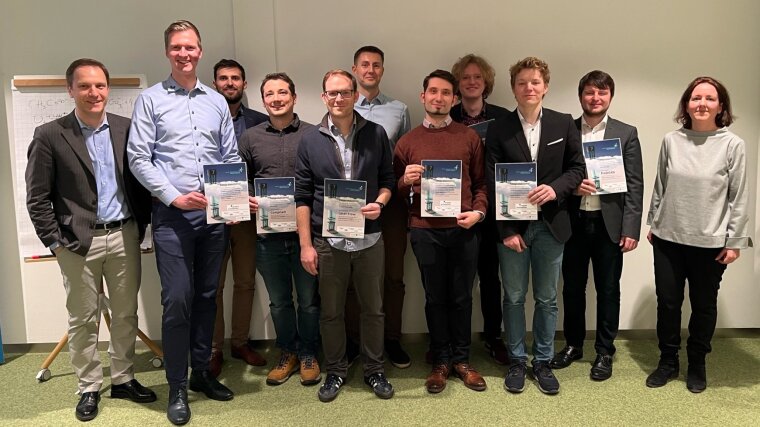
- Light
Published:
A special atmosphere was felt by all those present, as this time pitching finally took place in presence again - instead of online during the pandemic. The format is particularly aimed at all those ideas where photonic technologies comprise the core of a potential product development. The prize money in the form of a research budget covers six person-months of a PhD or postdoc - full time position, i.e. approx. 55,000 EUR per idea and team, in total over 275,000 EUR.
The winners are:
- Laser-Flow, Dr. Tino Schenk and Dr. Sven Stengel (at the Abbe Center of Photonics): "Laser-Flow": a novel high-throughput technique for diagnosing and monitoring single cell changes in liquid biopsies.
- CompCam, Dr. Günter Weber, Dr. Uwe Spillmann and Wilko Middents (at the Helmholtz Institute Jena): feasibility analysis of novel X-ray imaging based on the Compton effect.
- Vor-Ort-Sensorik (SustainIR), Steffen Biermann and colleagues for Micro-Hybrid Electronics GmbH, Hermsdorf (at Leibniz-IPHT): development of methods to enable fast and fully automated on-site analysis by using spectroscopy in the mid-infrared range (dispersive spectroscopy).
- ProDICAN - Christin Reimer, Dr. Johann Kufs and Prof. Falk Hillmann, Jena (at Leibniz-HKI): Cannabinoids can be produced in cultures of slime fungi under controlled conditions. Observation and control of this process using optical methods are the project goals.
- BeeSupervisor, Philipp Landwehr, Albert Dehne and team, Dresden (at Fraunhofer IOF): Development of an optical detection system to detect attack of a beehive by the parasite Varroa destructor (Varroa mite), which is responsible for most of the worldwide decline in bee populations.
- Situation analysis around the patient bed, Tobias Gebhardt, Marcel Walz and colleagues for GWA Hygiene GmbH, Stralsund: universal sensor unit that analyzes various situations around the patient bed, e.g. entries and exits of nursing staff, bed occupancy, recognition of falls.
- EnLight, Dr. Jan Sperrhake, Prof. Maria Mittag, Michael Steinert, Dr. Jan Petersen and Prof. Thomas Pertsch: Development of nanostructures on glass chips with multiple chambers of different environmental conditions and microbial cultures migrating in between - a light-controlled microverse.
The winning ideas will now be further developed in the above-mentioned Jena research institutes. In addition, three teams will be given the opportunity to collaborate with the Fraunhofer Center for International Management and Knowledge Economy (Fraunhofer IMW) to enhance their ideas - e.g. with the help of market feedback obtained via a digital platform to open up new fields of application (so-called "Crowd Innovation Challenge")
DIHP Pitches: diverse jury and space for exchange
The project manager, Dr. Sebastian Händschke, explains the idea of the DIHP Pitches: "With the pitches, we make it easier for internal and external team ideas to work together with university and non-university institutions. Participants benefit from the feedback, and the jury is pleased to receive many interesting projects. The exchange is helpful for all sides - pitchers (applicants), institutes and other partners. It is particularly positive that several small and medium-sized companies also applied this year."
To ensure that the evaluation of the projects is as differentiated as possible, the jury is made up of representatives of various institutions from business and science, including companies such as JENOPTIK, associations, transfer experts from the participating institutions but also, in particular, experienced founders such as Peggy Bärenklau and Dr. Peter Miethe. Dr. Claudia Reinlein, who presented her ideas for the first time at the DIHP pitch in 2020 and later founded Robust AO GmbH, was also a member of the jury. She said, "It's especially exciting for me to now sit on the jury after three years and hear so many interesting topics."
One of the winners of this year's pitch, Dr. Tino Schenk from Team Laser-Flow added, "We are still at the beginning of our development. For us it was a very appropriate and successful event." Philipp Landwehr from Team BeeSupervisor agrees: " Even in the waiting room, we exchanged ideas with the other pitchers and met so many exciting people and had interesting conversations."
About the Digital Innovation Hub Photonics (DIHP)
The Digital Innovation Hub Photonics (DIHP) is a consortium project, funded by the Ministry of Economy, Science and Digital Society (TMWWDG) of the Free State of Thuringia. Launched as a pilot project by the Fraunhofer Institute for Applied Optics and Precision Engineering (Fraunhofer IOF) in 2019, the DIHP was joined by other partners at the beginning of 2022: the Abbe Center of Photonics (ACP) at Friedrich Schiller University Jena, the Leibniz Institute for Natural Product Research and Infection Biology (Leibniz-HKI), the Leibniz Institute for Photonic Technologies (Leibniz-IPHT), and the Helmholtz Institute Jena (HI-Jena).
The DIHP aims to promote the transfer of technology from science to industry, in particular through start-ups and cooperation with small and medium-sized enterprises (SMEs). It works closely with other partners in Jena and Thuringia, such as the start-up and transfer services of Ernst Abbe University and the University of Jena, as well as the Thuringia Foundation for Technology, Innovation and Research (STIFT) and the Thuringia Center for Start-ups and Entrepreneurship (ThEx). In the current phase, the TMWWDG is providing funding of around 1.2 million euros for the DIHP project until the end of 2023.